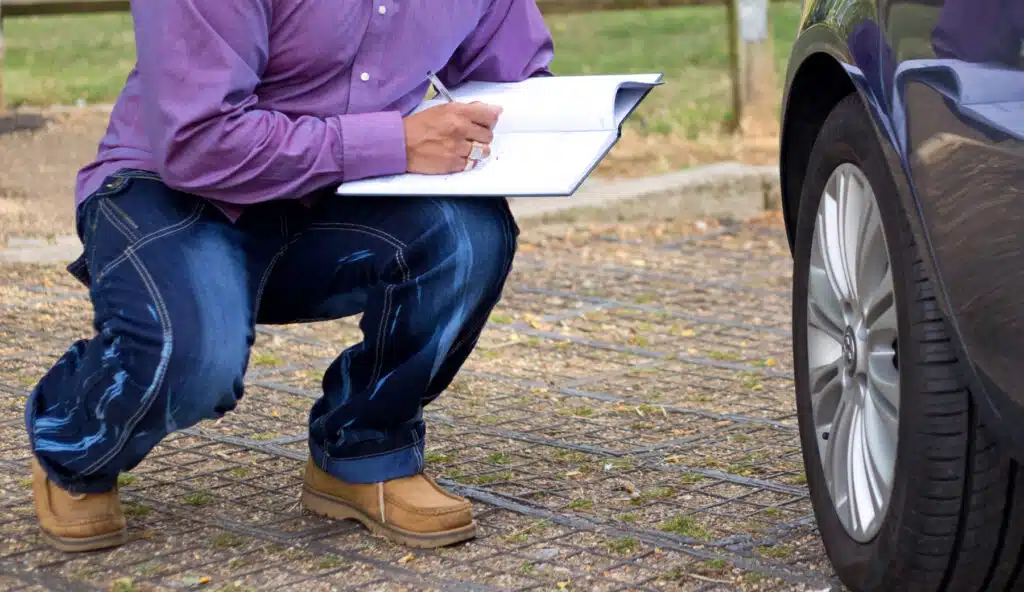Call Us for a Free Case Review
How to Deal With an Insurance Adjuster After a Car Accident in Oklahoma

Once you notify the insurance company that you’ve been in an accident and intend to file a claim, it won’t be too long before you can expect to hear from an insurance claims adjuster.
Car insurance adjusters play an important role in the insurance claim process. In theory, they exist to protect the insurance company from fraudulent claims, which helps keep rates lower for everyone.
However, there’s theory and then there’s reality.
In practice, insurance adjusters are paid to save insurance company money. This is true whether they represent the other party’s insurance company or your own. You may have paid your premiums faithfully for years, but as soon as you file a claim, your insurance company’s interests are no longer aligned with yours. They are strongly incentivized to hunt for any evidence or information that could justify a lower settlement offer, or even deny your claim outright.
In short, the insurance adjuster is not on your side. And talking with one can be dangerous for your auto accident claim, especially if you aren’t prepared. An experienced car accident attorney can help.
Don’t Admit Fault
One of the worst things you can do is say anything to a claims adjuster that suggests you may be responsible for the crash.
This might seem obvious enough, but it’s very easy to inadvertently do. Car accidents are traumatic experiences. And many people respond to that trauma by second-guessing themselves or reflexively apologizing, even when there isn’t anything to apologize for.
The problem here is that innocent-sounding statements like “I should have seen it coming,” “I wish I had acted fast enough,” or even “I’m sorry” could potentially be used against you in settlement negotiations.
Be Honest and Stick to the Facts

Once you lose your credibility in the eyes of the insurance company (or potentially a jury, if your personal injury case goes to trial), it’s almost impossible to get it back. Never lie or even exaggerate to the insurance adjuster. Chances are you will get caught.
When answering questions, stick to the basic facts of what happened. Don’t say more than you need to or provide any information that you weren’t asked about. And if you aren’t 100% certain about the details, the best thing you can do is simply say “I’m not sure” or “I don’t remember.” Do not try to guess or speculate about what happened.
Many people worry that saying “I don’t know” will make them look guilty in the eyes of the insurance company. But if it’s the truth, then it’s what you should say. It is far, far worse for your personal injury case if you guess and are proven wrong later.
Stay Calm
If you do end up on the phone with an insurance adjuster, it’s important to remain calm. No matter how stressed out or upset you may feel, remember to take deep breaths and be direct and polite.
Along with staying calm, some other key tips for your conversation include:
- Listen carefully to what the insurance adjuster says.
- Take notes (if you are able to).
- Be skeptical.
- Understand that the claims adjuster isn’t obligated to share all the information the insurance company has on your case with you.
- Don’t be afraid to (politely) ask open-ended questions or ask them to explain their reasoning behind a decision.
Don’t Give a Written or Recorded Statement

Sooner or later, your insurance adjuster will ask you to provide a recorded statement. Most accident victims believe this will make them look more credible to the insurance company or that it’s required. The truth, though, is that it’s much better to decline giving one, or at least wait until you’ve had an opportunity to discuss the matter with your personal injury attorney.
Recorded statements are not required, and they almost never really help your case. The big risk here is that insurance adjusters could use your written statement against you. For example, they may ask strategic questions that allow them to later deny your claim based on your responses. Or you might forget to bring up a few of the symptoms you’re experiencing during the conversation. The insurance adjuster can then point to that statement as a reason to deny compensation for medical treatment related to those symptoms.
In other words, recorded statements often function as tools the insurance company will use to play “gotcha” with crash victims. Giving a statement without first consulting an attorney could significantly impact the compensation you may be entitled to receive.
RELATED POST: How Do Adjusters Determine Who Is at Fault in a Car Accident? (getcolbert.com)
Don’t Sign a Medical Authorization Form
An insurance adjuster might encourage you to sign a medical authorization form, which gives them broad authority to access your medical records and medical history. The adjuster will probably tell you this is simply a way to speed up the claims process and get you your settlement offer sooner.
However, signing this form could end up significantly diminishing your chances of receiving compensation for your injuries.
With unrestricted access to your complete medical history, insurance claims adjusters will look for any information that could be used to deny your claim. This is especially risky if you have any pre-existing conditions. For example, the adjuster could discover that you saw a doctor for back pain several years before the accident. That gives the insurance company room to argue that your new symptoms weren’t entirely caused by the car accident.
Although it may be less efficient, it’s best to make sure the insurance company only has access to medical records that are directly relevant to their investigation. Working with an experienced accident attorney can help you in this matter.
Don’t Accept the Initial Offer

Insurance companies know that when you’re injured in a car accident, you likely want to settle your case quickly in order to have your medical bills and other costs covered. This can lead to them making their initial offer lower than what you deserve in hopes that you’ll feel pressured to accept.
The insurance company may even suggest that their initial offer is the best you will receive. This is not always the truth. Insurance companies are for-profit businesses, so their main goal is to pay out as little compensation as possible to injured parties.
Talk to an Auto Accident Attorney as Soon as Possible
Auto insurance adjusters often discourage accident victims from hiring a personal injury lawyer. You may hear some variations of the following:
- “This is the best offer you’re going to get—hiring an attorney isn’t going to change that.”
- “Working with an attorney is just going to drag out the process and cost you more money.”
Do not accept these arguments, especially if you don’t feel you’re getting the fair settlement offer you deserve. Insurance adjusters know that an attorney will fight for what’s fair, which costs them extra time and money.
Hiring an attorney to review your claim will give you the best chances of receiving a fair amount based on the extent of your injuries, property damage, and other related costs.
In fact, the best time to call an attorney is right away after the accident—before you even speak with an insurance adjuster in the first place. Depending on your circumstances, your attorney can either help you prepare for your conversations with the adjuster or simply handle the negotiations on your behalf and save you the stress.
The Wolf Pack™ at Colbert Cooper Hill Is Here for You

If you or a loved one was injured in a car accident due to the negligent actions of another driver, an experienced attorney like those on our team at Colbert Cooper Hill can negotiate with the insurance company on your behalf. We can help you avoid falling victim to their tactics and will fight for fair compensation.
To determine whether you may be eligible for compensation to cover medical bills, lost wages, pain and suffering, and other costs, it’s in your best interest to speak with an attorney as soon as possible. Contact the Wolf Pack™ at Colbert Cooper Hill by giving us a call or filling out our online form. Don’t wait. Get the help you need today.





